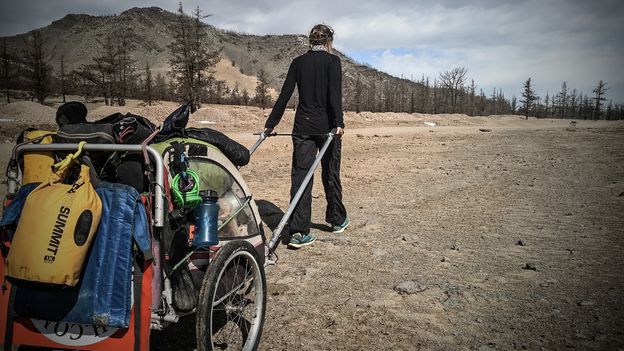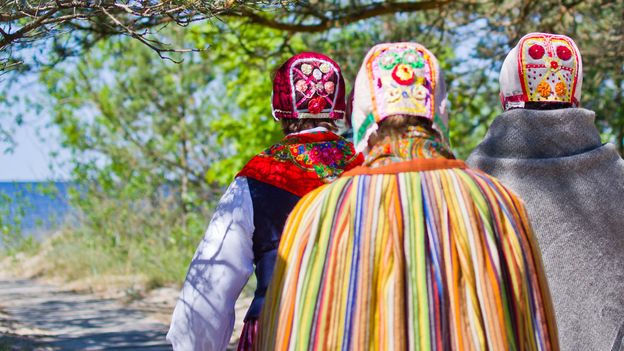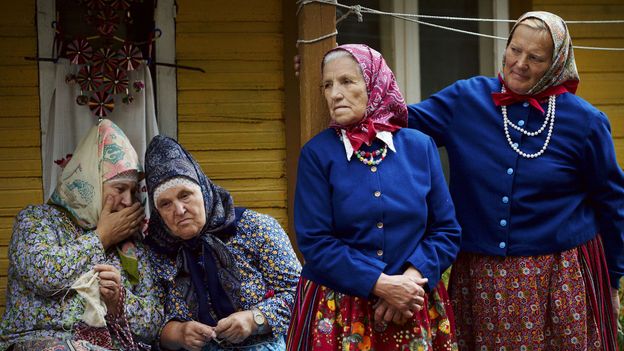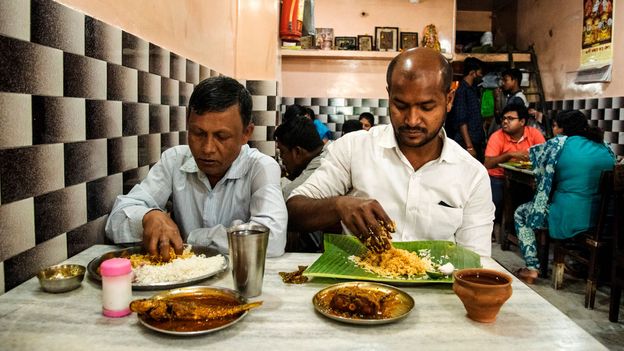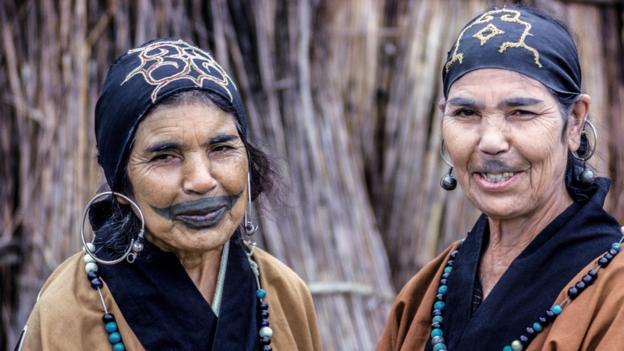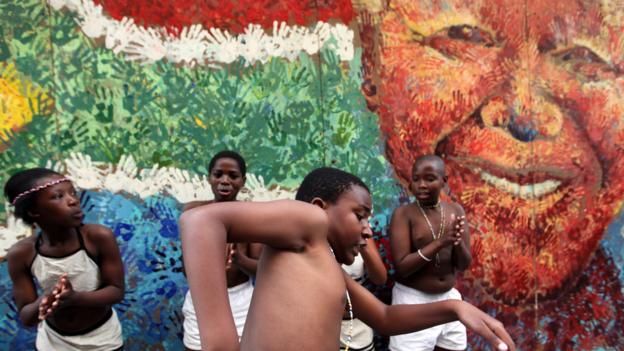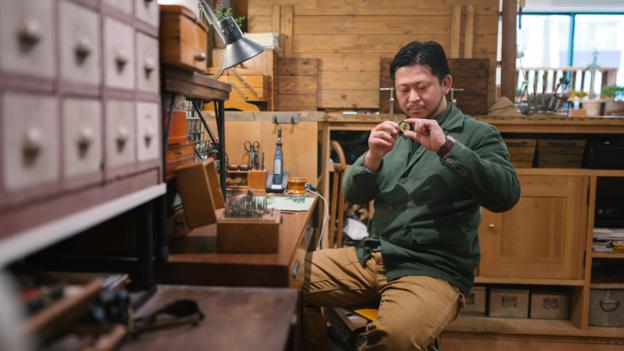Shyam Sunder Paliwal cracked open the pod and the blood-red seeds dribbled out. Holding it in his palm, he offered the fruit of the sindoor shrub up for inspection.
50 Reasons to Love the World – 2021
Why do you love the world?
“Because the more we protect the environment [around Piplantri, India], the more it will reciprocate. Those who work with nature don’t worry too much. Nature gives me strength; our daughters and this work gives us strength.” – Shyam Sunder Paliwal, eco-feminist
The plant, which produces the vermilion powder that Indians often apply on their foreheads for cosmetic and religious purposes, doesn’t normally grow in this region. But it is one of many types of trees that now grow in Piplantri, a collection of six connected hamlets in Rajasthan in north-west India.
In 2005 when Paliwal became the sarpanch, or village head, marble mining had denuded the hills; the surrounding land was parched and the foliage degraded. And like in most of India, daughters here were viewed as a financial burden and devalued compared to sons, who typically help support their parents economically.
Then in 2007, Paliwal’s 17-year-old daughter Kiran died following a bout of dehydration. Heart-broken but eager to honour her memory, his family planted a tree near the entrance of the village in her name. As Piplantri’s leader, Paliwal thought, why not turn this one-off event into a wider programme? Soon, other villagers began to follow his lead.
Now, every time a girl is born in Piplantri, villagers plant 111 trees – an auspicious number for local Hindus – to both honour her and to regenerate the environment.
“If we can do it in one girl’s name, why not do it in every girl’s name?” said Paliwal. The region now has more than 350,000 trees, from mango and gooseberry to sandalwood, neem, peepal and bamboo, growing across the once-barren lands and covering an estimated 1,000 hectares.
In recent years, Paliwal’s simple idea has expanded into a broader eco-feminist movement. Along with tree planting, new parents of daughters also sign an affidavit saying they won’t marry them off before they turn 18 and will let them finish school. Villagers also chip in to open a fixed- deposit account for each girl with Rs 31,000 (£305) that she can access once she turns 18, either for her education or to help pay for her wedding. What’s more, Piplantri’s growing forest is now serving as an example of how Indian villages can literally go green while improving their water management.
Paliwal’s simple idea has expanded into a broader eco-feminist movement
Under leafy cover, and with warnings to watch out for snakes and scorpions, Paliwal led me to a small clearing with a single, slender burflower tree near the village’s entrance. It was the first tree he planted, now surrounded by scores of others.
Though villagers plant the 111 trees for each girl born year-round, every August during the monsoon, a special tree-planting ceremony takes place for all girls born in the preceding 12 months. Paliwal estimates that about 60 girls are born each year in this 5,500-person village. Grown girls who had trees planted in their names now come to tie rakhi bracelets around saplings, considering them siblings to be venerated during the festival of Raksha Bandhan. In one part of the village, sarpanches and other visiting officials are encouraged to take an oath besides a banyan tree, promising to work responsibly and protect the environment.
“Historically, people from this region of [Rajasthan] are warriors who have never accepted defeat. And neither will we,” said Paliwal, before reciting the names of legendary kings the region had produced. “In earlier centuries they fended off attacks, now we fight disease and pollution.”
As Piplantri’s trees have grown, its groundwater level has increased and a marked cultural shift has improved the status of women. Nikita Paliwal (no relation to Shyam Sunder), now 14, was among the first girls to have trees planted in her name. Now, she hopes to become a doctor and work for the poor. “We should also stand on our own feet,” she said.
You may also be interested in:
• Vandana Shiva on why the food we eat matters
• The tiny forests designed by feng shui
• India’s progressive egalitarian society
“If you keep working, the results will show,” said Shyam Sunder. “And people will join you.”
Of course, it takes a village. That morning, groups of women were toiling to prepare the land for planting. Though the ceremonial planting only happens once a year, the work happens year-round.
Wearing a bright red sari and a broad smile, Nanubhai Paliwal, Nikita’s aunt, said she had two sons but as Piplantri started honouring its girls, she started wishing for granddaughters. Now she has two, and trees were planted when they were born.
“Earlier they were considered a burden. Now we don’t think that way,” she said. “We have no particular desire for sons.” She then looked around, pointing at all the trees. “It was a small village. We worked hard, we made it special. And this way we get employment and income, too.”
It was a small village. We worked hard, we made it special
This is a key part of the village-wide strategy: not merely to honour girls or regenerate the environment, but to leverage reforestation to generate income for local residents. “How can everyone be employed through industry?” Shyam Sunder asked. “Our approach is to create employment through natural resources.”
The village has set up women’s cooperatives that create products from aloe vera, such as juices, food items and gels, to sell in the village. In the coming year, they plan to expand to products made from gooseberries, bamboo and honey, all of which have been planted or cultivated as part of the village’s greening efforts.
“You have to link it all,” Paliwal said. “If you plant trees, you need water and soil. Then you attract birds, and more greenery brings more rain.” Villagers also plant 11 trees whenever someone dies. All of the planting takes place on communal land spread through the village that had previously been illegally developed. Shyam Sunder pointed to the mountains in the distance, carved out and deeply mined, but showing nascent vegetation.
“Where there is mining, there is degradation,” he said. “We have been working to offset this.” At the top of one stone-filled hillock, green shoots of sugarcane plants erupted, seemingly out of nowhere.
Piplantri’s water-harvesting plan has involved trapping water runoff and increasing the groundwater level by building ditches, bunds and dams. Across the village, large posters showing before-and-after pictures testify to Piplantri’s transformation: from dry and brown to green and verdant. Now, clear pools shone in the distance. Around a statue erected in honour of Kiran, geese flitted by, drinking water. As rabbits gambolled in a pen, a peacock crossed the road near a building topped with a solar panel.
“I can see a vast difference between 2007-08 and now, and it shows you how one person can effect change,” said Nimisha Gupta, the chief executive officer of the district’s local governing bodies. “Government schemes, if implemented properly, can do wonders. But not all villages utilise the budgets well.”
In 2018 the state government instituted a training centre here to educate people on the “Piplantri Model”. The building hosts engineers, officials and residents from other districts who hope to replicate Piplantri’s model of water harvesting and tree planting elsewhere in Rajasthan and the country. As many as 50 to 60 visitors come to Piplantri some days – most of whom come to attend workshops in the training centre – and the village even has a set of cottages to house them.
According to Gupta, part of Piplantri’s environmental success comes from viscerally linking the environment to the people. “When you attach it to tradition and make trees like family members, it makes sense emotionally,” she said.
The village’s connection to nature is palpable. That afternoon, local resident Prem Shankar Salvi, appeared with his wife and one-year-old daughter, Ruchika, at the centre of the village with a cake. Salvi had wanted to celebrate his birthday amidst the greenery.
“To do it this way is special,” he said. “We thought, why not do something different?”
Things have changed
When Ruchika was born, Salvi and his wife planted trees, signed the affidavit and opened a fixed-deposit account for her.
“Let her do as she wishes once she grows up,” said Salvi. “When she was born, it was like the goddess Lakshmi had come to our house.”
Salvi will enrol his daughter in school, which is free at primary level. In fact, in one of the nine government-run village schools here, the enrolment of girls to boys is 33:19. “No-one has dropped out, regardless of caste or background,” said Giridharilal Jatia, a local school principal. “For the past 10 years, we have been seeing this. Earlier, fewer girls attended.”
Yana Paliwal (no relation to Nikita or Shyam Sunder), who is just two years old, doesn’t understand yet that trees have been planted in her name or that her parents have high hopes for her. Her mother, Sangeeta Paliwal, who moved to Piplantri after marrying 12 years ago, had little access to education as a girl but is determined her daughter should study first and think of marriage later. Sangeeta used to cover her face out of modesty, following the conservative practice of ghunghat in her own village, but not in Piplantri. Here, she was able to finish her college degrees through distance learning, she drives, and she has started working.
“Things have changed,” she said.
BBC Travel celebrates 50 Reasons to Love the World in 2021, through the inspiration of well-known voices as well as unsung heroes in local communities around the globe.
—
Join more than three million BBC Travel fans by liking us on Facebook, or follow us on Twitter and Instagram.
If you liked this story, sign up for the weekly bbc.com features newsletter called “The Essential List”. A handpicked selection of stories from BBC Future, Culture, Worklife and Travel, delivered to your inbox every Friday.



